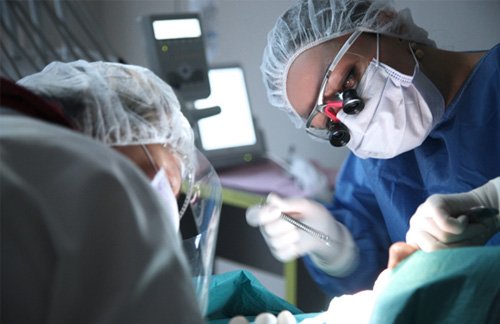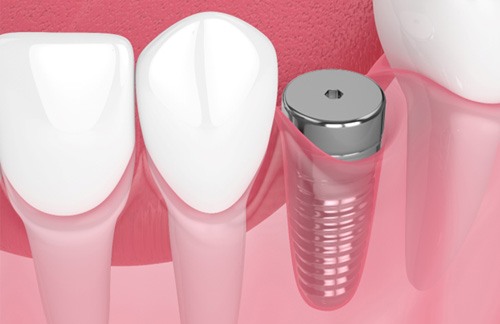Dental Implants
Expertly Placed. Skillfully Restored. All Under One Roof.
Dr. Matthew Lann, our board-certified periodontist, and Dr. George Salem, our general dentist with over four decades of experience, collaborate to provide patients with phenomenal results using dental implants in Braintree. Whether you’re missing one, several, or all of your teeth, our talented team can restore your smile to as good as new with this leading-edge, gold standard treatment. Start your journey by calling our office and scheduling a consultation today!
Why Choose Dr. George Salem and Associates, PC of Braintree for Dental Implants?
- Start-to-Finish Dental Implant Treatment In-House
- We Offer Multiple Flexible Ways to Pay
- Dentist with 40+ Years of Experience
What Are Dental Implants?

Dental implants themselves are small titanium posts that are surgically placed below the gumline and into the jawbone to restore the roots of missing teeth. Due to their biocompatible nature, they’re able to fuse with the bone to provide it with necessary blood flow and stimulation, keeping it from eroding over time. After this process has occurred, known as osseointegration, Dr. Salem will restore the implants with custom-crafted prosthetics, like a dental crown, bridge, or denture, to complete the smile.
The 4-Step Dental Implant Process

Dental implants replace the entirety of the missing teeth, including the root and the crown. This allows for numerous additional benefits that you can’t find with other tooth replacement options. However, dental implants require a multi-step process that spans over the course of several months. Everyone’s treatment littles a little bit different, but here are the four main steps that everyone can expect.
Initial Dental Implant Consultation

The first step of getting dental implants is completing an in-depth consultation. This consists of an evaluation of your teeth and gums, as well as a detailed talk with Dr. Salem about your smile goals. Based on our diagnostic findings, we will outline a treatment plan and walk you through it so you know exactly what to expect throughout the process. You’ll also have an opportunity to ask any questions you may have.
Dental Implant Surgery

The next step of your treatment will be your dental implant placement with our board-certified periodontist, Dr. Matthew Lann. After numbing the area with a local anesthetic, he will make a small incision in the gumline to place the implants into the jawbone. The gums are closed and protective caps are placed over the implants to keep them safe as they heal.
Dental Implant Osseointegration & Abutment

The next three to six months following your surgery, your implants will undergo a process called osseointegration, where the titanium implants fuse with the jawbone. This will make them a strong support system for your prosthetics. Once this has occurred, we’ll call you back in to place abutments on the tops of your implants, which are small metal connector pieces. Impressions are also taken so your restorations can be custom-crafted in the dental laboratory.
Delivery of Dental Implant Restoration(s)

Finally, once your permanent prosthetic is finished, you will return to the dental office. Dr. George Salem will secure it to your abutments and implants to provide you with a natural-looking and feeling, fully functional set of teeth. If everything looks and feels great, you will be left to show off your beautiful, complete smile!
Benefits of Dental Implants

Dental implants offer a wide array of benefits that distinguish them from traditional tooth loss solutions, like traditional dental bridges. If you’re interested in learning a bit more about why so many patients choose to restore the look, health, and function of their smiles with them, then keep reading!
Day-to-Day Benefits

Below are some of the many day-to-day benefits that you’ll enjoy with dental implants:
- Improved Self-Esteem – Since dental implants are custom-made for each patient and function very similarly to natural teeth, many patients are drawn to how lifelike they are. The fact that they don’t draw any unwanted attention to your smile either will drastically boost your confidence as well as your overall quality of life!
- Strengthened Bite – Dental implants are unique because they don’t rest against your gums or surrounding teeth for support. Instead, they get their strength from your jawbone, which makes the strength of your bite considerably stronger.
- Clearer Communication – Even one missing tooth can negatively impact your enunciation. The good news is that dental implants can restore any number of missing teeth, resulting in clearer communication.
Health Benefits

One of the reasons patients and professionals alike prefer dental implants is because of the health benefits they offer, including:
- Preserve Your Jawbone – Something else that makes dental implants unique is that they are the only tooth-replacement solution that preserves your jawbone. This helps prevent bone loss while also preserving your youthful face shape.
- Prevent Dental Drift – Did you know that the teeth surrounding the gap can start to move? This phenomenon is referred to as “dental drift,” and it can negatively impact the look and function of your smile. Fortunately, dental implants can seamlessly fill the open space, preventing this and other dental problems in the process.
- Avoid Malnutrition – It’s no secret that tooth loss can negatively impact the strength of your bite. As a result, many patients are left eating only soft foods, like applesauce, yogurt, and cottage cheese. Dental implants, however, can help restore the strength of your bite and, in turn, help you eat a more varied, nutrient-dense diet.
Long-Term Benefits

Of course, this list wouldn’t be complete without the long-term benefits of dental implants. Here are two noteworthy ones:
- High Success Rate – Extensive research has been done on dental implants, and they currently have an impressive 95% success rate. It’s actually even higher among non-smoking patients!
- Longevity – If cared for properly, dental implants can last for up to 35 years. The best part is you don’t need to adopt a cumbersome oral hygiene regimen – just use the same best practices that keep your natural teeth healthy!
Who Dental Implants Can Help

Due to this treatment’s versatility, dental implants can help a variety of patients looking to restore their smile affected by missing teeth. So, whether you’re missing one tooth or you don’t have any of your natural teeth left, don’t hesitate to schedule a consultation with us to find out if dental implants in Braintree are right for you! In the meantime, you can read on to learn more, including some of the qualities we look for in a good candidate.
Who Is a Good Candidate for Dental Implants?

At your consultation, we will review your dental and medical history before completing a comprehensive oral exam and learning more about your lifestyle. The goal is to determine if you have sufficient jawbone density, if you’re in good overall health, if your gums are healthy, and if you’re committed to healthy habits, like brushing and flossing consistently. If that’s the case, then we can restore your smile using one of the three methods below.
Missing One Tooth

If you’re missing one tooth, we can replace it with a single dental implant. Once it has undergone osseointegration, it will act as a post to hold a free-standing dental crown securely in place. Not only does this allow us to replace both the root and crown of your tooth, but it also prevents the surrounding teeth from needing to be altered in the process. Plus, with proper care and maintenance, your dental implant can last for several decades.
Missing Multiple Teeth

If you’re missing multiple teeth, we have good news: we can fill the gaps in your smile! The first option is replacing each tooth with a single dental implant. The second option is securing a custom bridge in place with dental implants. The third option is creating a partial denture and anchoring it in place with several strategically placed dental implants. If you aren’t sure which option is ideal for you, that’s okay – we will help you decide at your consultation.
Missing All Teeth

While traditional dentures rest against your gums, implant dentures are secured to your jawbone. Not only does this replicate the natural structure of teeth for enhanced stability and strength, but it also prevents unwanted movement. If we decide together that this is the best tooth-replacement solution for you, then we will place anywhere from four to six dental implants across the arch to anchor it.
Learn More About Implant Dentures Learn More About All-on-4 Dental Implants
Understanding the Cost of Dental Implants

There are many rumors about the cost of dental implants in Braintree, so you may think they are too expensive for your budget. However, dental implants can cost about the same as traditional tooth replacement methods. Many factors affect the cost of dental implants, but we offer the solutions you need to keep them affordable. You can invest in the priceless benefits of dental implants without sacrificing an arm or a leg.
Preliminary Treatments & Dental Implant Surgery

Replacing a lost tooth with a dental implant occurs in several steps, each with different fees. You can pay for each step as you go, so you don't have to come up with a large amount of cash at once. After an initial consultation with an implant dentist in Braintree, they'll create a personalized treatment plan and provide you with an estimate. It's not uncommon to require a little prep work before getting dental implants, which will be factored into the cost. After you've recovered from any preliminary procedures, you'll be scheduled for your placement surgery.
The Parts of Your Dental Implant

In addition to any prep work and your placement surgery, your estimate will also include the cost of your dental implants, which includes:
- Implant Post: An implant post will be surgically placed into your jaw to serve as a new tooth root.
- Abutment: Every implant will require an abundant, which is a fixture needed to attach your restoration to the post.
- Restoration: Depending on the number of teeth you are replacing, you'll require either a dental crown, bridge, or denture.
How Dental Implants Can Save You Money

Dental implants are actually the most cost-effective method of replacing lost teeth because they have over a 95% success rate. They are proven to last for 30 years or longer, so you won't have to budget for replacements. Traditional tooth replacement options only last for a few years before needing new ones, which can get costly over time. Dental implants can save you money down the road. They are also the only treatment to offer jawbone preservation to improve your oral health. You'll also avoid needing costly dental work later. As the next best thing to real teeth, dental implants offer priceless benefits.
Does My Dental Insurance Cover Dental Implants?

Dental implants in Braintree are not fully covered by dental insurance. However, your insurance benefits may pay some of the expenses for your consultation, diagnostic services, and any preparatory procedures that are medically necessary. After meeting your annual deductible, your dental insurance can pay some of the costs for your restoration until you reach your yearly limit. We will work on your behalf with your dental insurance to maximize any applicable coverage.
Making Dental Implants Affordable

Besides using your dental insurance, we offer other solutions to keep dental implants affordable, including:
- Traditional Payments: Our office accepts all traditional payment methods, including cash, personal checks, and most credit cards.
- Financing: Based on your credit approval, you can pay any out-of-pocket costs using monthly installments through a third-party financing company, like CareCredit. You can enjoy little or no interest in financing to keep dental implants within your budget.
Dental Implants Post-Op Instructions

These prosthetic teeth have the capability to last a lifetime, but the brief period following the implant surgery is critical to that success. As a result, it’s important to follow our aftercare instructions. We will discuss these in person with you before the procedure, but here are some guidelines to keep in mind so that your recovery can be as smooth as possible.
What to Do Directly After Dental Implant Surgery

As soon as you leave our office following the implant placement procedure, you need to go home and rest. In fact, we strongly recommend taking it easy for at least 48 hours, meaning you should refrain from strenuous activities, including work, for a couple of days. Although considered minor, this is still a surgical procedure, and your body will require time to heal.
In the hour after you get home, the site may continue to bleed slightly, but it should slow down. If necessary, switch out the saturated gauze for a new clean and damp one, and gently bite down. This will allow an essential blood clot to form. If bleeding doesn’t stop after more than an hour, reach out to us.
Common Side Effects When Recovering from Dental Implant Placement

In bouncing back from dental implant surgery, you may notice certain side effects, including soreness or discomfort, slight swelling, and a metallic taste in your mouth, just to name a few. These are normal and can be managed with over-the-counter pain reliever and a cold compress.
If you ever experience a fever over 101 degrees Fahrenheit or any other abnormal symptom, call us immediately.
Your Diet After Dental Implant Surgery

Drinking small sips of water can help keep your mouth hydrated and rinse away potentially harmful bacteria. However, do not drink anything through a straw for at least 48 hours. Sucking could force the blood clot to come off prematurely, opening the door for a painful complication called dry socket.
If you can, try to wait a couple of hours before eating to give the clot plenty of time to form. Start with liquid and soft foods, but stay away from hard, sugary, and hot foods for at least a day. Yogurt, for example, is a great choice after the procedure. Over the course of about a week, slowly reintroduce more normal foods back into your diet, but always be cautious not to harm the site.
Post-Op Health & Oral Hygiene

Unfortunately, oral bacteria don’t rest even though you will. As a result, it’s important to maintain oral hygiene. You may brush the rest of your teeth as usual on the day of your surgery but be extremely careful around the site. You may also rinse your mouth with warm salt water but avoid spitting too forcefully. Also, although you can enjoy a soft treat, such as ice cream, during your recovery, you need to keep your diet mostly healthy to help your body heal optimally.
What to Do After Your New Teeth Are Attached

Later in the process, when your prosthetic teeth have been bonded onto your implants, you may use and maintain them as you would normal teeth. At first, it’s a good idea to bite and chew slowly so that you become accustomed to your new teeth without accidentally biting your tongue or cheeks.
Dental Implant Maintenance & Care

Making the leap and getting dental implants is a big investment, and our team wants to see you continue enjoying your smile for decades to come. That’s why we encourage all of our patients to follow these helpful dental implant maintenance tips we’ve outlined below. With a good at-home and professional oral hygiene routine, your dental implants can last for 35 years or longer!
Prioritize Your Oral Hygiene

Just like with your natural teeth, brushing and flossing every day is an important part of warding off the threat of oral infections as well as plaque and tartar accumulation. Be sure to use a soft-bristled toothbrush and fluoridated toothpaste. If you’re not as diligent about flossing every day as you wish you were, you could always try to invest in a water flosser or flossing picks to make the task easier. Don’t forget to also rinse your mouth with antimicrobial, alcohol-free mouthwash daily!
Maintain a Balanced Diet

What you eat can have more of an impact on the health of your dental implants than you may have thought. Because harmful bacteria love to feed off of carbohydrates, it’s best to balance your intake of sugary and starchy foods with fresh fruits and vegetables, and other snacks that will help prevent bacteria accumulation.
Stop Bad Oral Habits

Studies have shown that oral habits, like smoking and tobacco use can increase the risk of dental implant failure. This is because the act of smoking reduces blood flow throughout the mouth, slowing the osseointegration and healing processes following dental implant surgery. As a result, the implants may not be able to successfully fuse with the jawbone. Following your procedure, take steps towards quitting this habit for both your health and smile. One of the best ways to get started is by consulting with your primary care physician.
Protect Your New Teeth

Bruxism, the process of clenching and grinding your teeth as you sleep or even throughout the day, can cause unnecessary wear and tear on your dental implants and new restorations. As a result, they may break, become worn, or even become loose or fall off of the implant. By investing in a customized nightguard, you can ensure that your dental implants and replacement teeth remain protected from the tension and force of grinding and clenching.
Plan Your Regular Checkups & Cleanings

In addition to practicing good at-home dental hygiene, it’s also important to schedule your routine checkups and cleanings in Braintree. Our team will professionally clean your restorations and clear away any plaque or tartar build-up to prevent the development of oral health concerns like cavities, gum disease, and tooth infections.
Dental Implant FAQs
Can I Take Dental Implants Out?
Dental implants in Braintree are meant to serve as a lifetime solution for tooth loss. Only a trained dental professional can remove them, such as in cases of failure. They are a lifelong commitment. A titanium implant post will be surgically placed into your jaw to serve as a new root. Your jaw will fuse to the post through a process called osseointegration. Therefore, you can't take it out. However, some implant dentures are removable for easy cleaning.
Does Getting Dental Implants Hurt?
Your implant dentist in Braintree will keep your comfort as their number one priority. After the effects of any medications wear off, you can expect your mouth to be sore for a few days. It's important to take over-the-counter or prescribed pain medications to keep yourself comfortable. Applying a cold compress can reduce pain, inflammation, and bruising. Sleeping with your head elevated can also reduce pain. Your dentist will review your dietary instructions before you go home, like consuming liquids for the first 1-2 weeks.
What Are the Signs of Dental Implant Failure?
The risk of dental implant failure is less than 5%, but it's important to be vigilant for any signs of a problem. Quick detection and treatment can prevent your new smile from failing. Don't wait to contact your dentist if you have redness, inflammation, or bleeding near the implant. Schedule an appointment if you experience pain when placing pressure on your implant.
What Should I Do If My Implant is Loose?
After your jaw has integrated with your post, your dental implant should never feel loose. If you're experiencing any instability, it is a dental emergency. It could be as simple as a damaged restoration, but it may also be a sign of a serious problem, like an infection or bone loss. Your dentist will get to the source of the problem to create a personalized strategy to save your smile.

